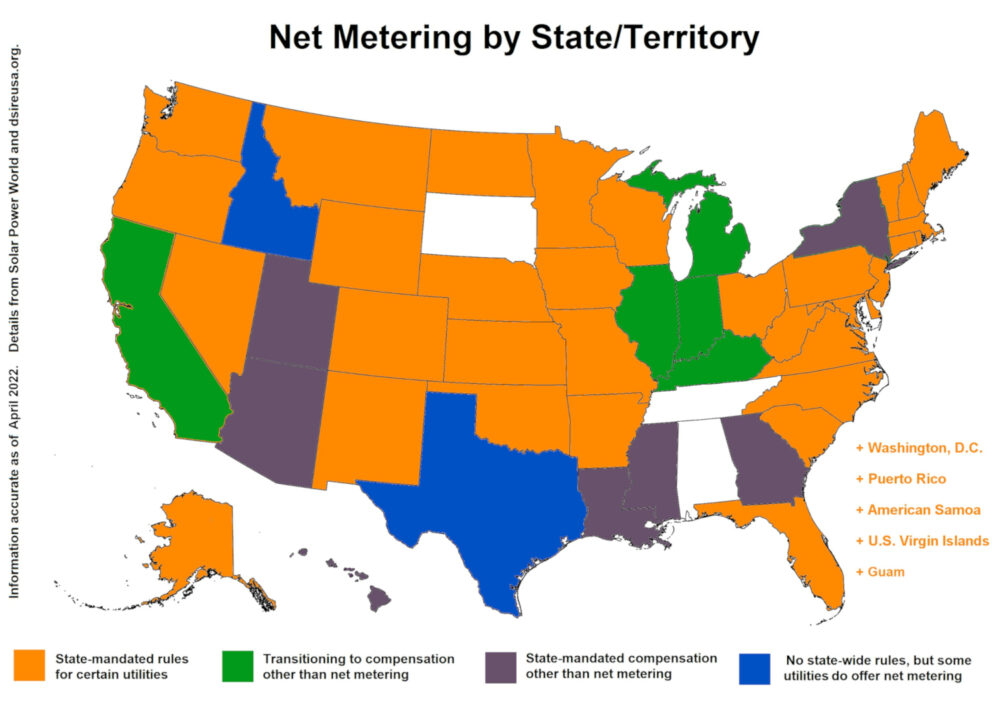Your cart is empty
Shop our productsAre you looking for ways to be less pollutive on the environment?
Using renewable energy sources, such as solar panels or wind turbines, is a popular solution.
However, the upfront costs of installing these technologies can be a significant barrier for many people.
This is where net metering comes in, providing a financially feasible option for many who want to invest in renewable energy. But what exactly is net metering, and how does it work?
In this article, we'll delve into the details of this policy, exploring the potential benefits and drawbacks for individuals and businesses. We'll also look at how net metering is being implemented in different parts of the world and how it shapes the renewable energy landscape.
Whether you're someone looking to lower your carbon footprint or a business seeking to lower your energy costs, net metering could be the solution you've been searching for.
So, let's explore this innovative policy and see how it can help you positively impact the environment and your bottom line.
What Exactly Is Net Metering?
Net metering is a billing arrangement for electricity generated by customers using renewable energy sources, such as solar panels or wind turbines.
The term "net" refers to the difference between the amount of electricity generated by the customer's renewable energy system and the amount of electricity consumed from the utility grid.
Under net metering, when a customer generates more electricity than they consume, the excess electricity is sent back into the utility grid, and the customer is credited for any excess energy generated.
The customer's electricity bill reflects the "net" amount of electricity consumed, which is calculated by subtracting the amount of excess electricity generated from the total amount of electricity consumed.
Net metering policies differ by state and utility, but they generally involve a meter that tracks the flow of electricity in both directions.
Some states have limited the amount of excess energy that can be credited or require customers to pay additional fees to participate in net metering programs.
Overall, net metering has been a key driver of renewable energy adoption and has helped to reduce greenhouse gas emissions by enabling more customers to generate their own clean energy.
Do All States in The U.S. Allow Net Metering?

As of September 2023, net metering is allowed in most states in the USA, but the specific policies and regulations vary by state.
Currently, there are only a few states that do not have statewide net metering policies or have limited net metering policies in place.
Some states, such as California and Massachusetts, have particularly favorable net metering policies that allow customers to receive retail credit for excess electricity generated by their renewable energy systems.
Other states, such as Nevada and Maine, have implemented changes to their net metering policies in recent years, which have reduced the benefits of net metering for some customers.
It's worth noting that net metering policies are subject to change, as they are often reviewed and updated by state regulators.
Additionally, some utilities may offer alternative programs or incentives for customers who generate renewable energy, even if they don't have a formal net metering policy in place.
If you'd like to learn more about the specific laws in your area, we would always recommend finding this information on your state's public utility commission website or by contacting your local utility directly.
For example, here is the public utility commission website for California.
How Is Net Metering Beneficial?

Net metering is a policy that provides several benefits for individuals and businesses that generate their own renewable energy.
Here are five key benefits of net metering:
Cost savings
Net metering allows individuals and businesses to offset their electricity costs by generating their own electricity. This allows for large cost savings over time, particularly as the grid's electricity price continues to rise.
Increased use of renewable energy
Net metering encourages the adoption of renewable energy by making it more financially feasible for individuals and businesses to invest in these technologies. This, in turn, can help to reduce dependence on damaging fossil fuels such as coal.
Reduced strain on the grid
By generating their electricity, net metering participants help to reduce the demand on the utility grid during peak usage times. This can help to reduce the risk of power outages and improve the overall reliability of the grid.
Local economic development
Installing renewable energy systems can create local jobs and stimulate economic growth. Net metering policies can help to encourage this development by providing a financial incentive for individuals and businesses to invest in these technologies.
Increased energy independence
Net metering can help individuals and businesses to become more self-sufficient when it comes to their energy needs. By generating their own electricity, they are less reliant on the utility grid and are better able to withstand power outages or other disruptions to the grid.
Final Thoughts
Net metering is a policy that provides a wide range of benefits for individuals and businesses who'd like to begin generating their own renewable energy.
From cost savings and increased use of renewable energy to reduced strain on the grid and local economic development, net metering can help to promote a more sustainable and self-sufficient energy system.
While net metering policies vary by state and utility service area, they have become ever more popular as people continue looking for ways to reduce or eliminate their carbon footprint while lowering their energy costs.
However, it's important to note that net metering has drawbacks, and some changes to net metering policies have raised concerns among certain stakeholders.
Overall, net metering represents a promising tool for promoting the adoption of renewable energy and increasing energy independence.
As the earth and its people continue to wrestle with the impacts of climate change, policies like net metering will likely play an increasingly critical role in moving to a more sustainable energy system.
Shop products from this article
You May Also Like

What Does a 30% Federal Solar Tax Credit Mean and How to Apply?
Governments around the world are offering programs that encourage homeowners to switch to solar energy. Among the most notable programs is the 30% Federal Solar Tax Credit. It reduces your...

Deadly Flooding Devastates U.S. South and Midwest — What You Need to Know




















































































































































































































































